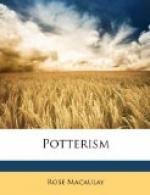‘That poor chap,’ Jukie said to me afterwards. ’He’s in a wretched position. He has to profess Christianity, and he doesn’t want even to try to live up to it. At least, whenever he has a flash of desire to, that atheist wife of his puts it out. She’s the worst sort of atheist—the sort that says her prayers regularly. Why are parsons allowed to marry? Or if they must, why can’t their wives be chosen for them by a special board? And what, in Heaven’s name, came over a Potter that he should take Orders? The fight between Potterism and Christianity—it’s the funniest spectacle—and the saddest....’
But Juke on Christianity always leaves me cold. The nation to which I (on one side) belong can’t be expected to look at Christianity impartially—we have suffered too much at the hands of Christians. Juke and the other hopeful and ardent members of his Church may be able to separate Christianity from Christians, and not judge the one by the other; but I can’t. The fact that Christendom is what it is has always disposed of Christianity as a working force, to my mind. Judaism is detestable, but efficient; Christianity is well-meaning but a failure. As, of course, parsons like Juke would be and are the first to admit. They say it aims so high that it’s bound to fail, which is probably true. But that makes it pretty useless as a working human religion. Anyhow, I quite agree with Juke that it is comic to see poor little nonentities like Frank Potter caught in it, tangled up in it, and trying to get free and carry on as though it wasn’t there.
Of course, nearly all the rest of that crowd at Jane’s wedding was carrying on as if Christianity weren’t there without the least trouble or struggle. They were quite right; it wasn’t there. Nothing was there, for most of them, but self-interest and personal desire. We were, the lot of us, out to make—to grab and keep and enjoy. Nothing else counted. What could Christianity do, a frail, tilting, crusading St. George, up against the monster dragon Grab, who held us all in his coils? It’s no use, Jukie; it never was and never will be any use.
I suddenly grew very tired of that party. It seemed a monster meeting of Potterites at play—mediocrity, second-rateness, humbug, muddle, cant, cheap stunts—the room was full of it all.
I went across to Jane to say good-bye. I had scarcely spoken to her yet. I had never congratulated her on her engagement, but Jane wouldn’t mind about that or expect me to.
All I could say now was, ’I’m afraid I’ve got to get back. I’ve some work waiting.’
She said, ’Is it any use my sending you anything for the Fact?
‘From the enemy’s camp?’ I smiled at her. She smiled too.
’I’ve not ratted, you know. I’m still an A.P. I shall come on the next tour of investigation, whenever that is.’
‘Shall you write for the Haste?’ I asked her.
’Sometimes, I expect. Oliver says he can get me some of the reviewing. And occasional non-controversial articles. But I don’t want to be tied up with it; I want to write for other papers too.... You take Johnny’s poetry, I observe.’




